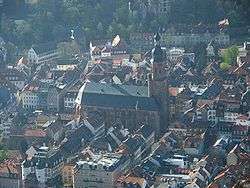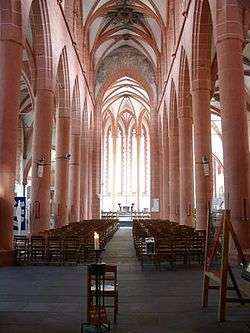Church of the Holy Spirit, Heidelberg


The Church of the Holy Spirit (German: Heiliggeistkirche) is the most famous church in Heidelberg, Germany. It stands in the middle of the market place in the old center of Heidelberg not far from the Heidelberg Castle. The steeple of the church, rising above the roofs, dominates the town.
Early history
The Church of the Holy Spirit is first mentioned in a manuscript from 1239. In 1398, the foundations of the current late Gothic church were laid on the site of a late Romanesque basilica which, in turn, had been erected in the place of an even older church. Thus the current church is the third sacral building on the site.
Construction

Documents name Arnold Rype, who was also mayor of Heidelberg for a time, as the master builder. In the usage of the time, the term "master builder" referred not to the architect but the financial coordinator. The only known architects during the church's construction are Hans Marx, who worked on the church until 1426, as well as Jorg, who was responsible until 1439. Both men probably supervised work on the nave. Under the reign of Prince-elector Frederick I a noted specialist in the construction of church towers, Niclaus Eseler, came from Mainz to Heidelberg and was probably responsible for the execution of the primary work on the spire of the Church of the Holy Spirit. Nevertheless, the steeple was completed by Lorenz Lechler.
Stages of construction
The construction lasted for some one hundred and fifty years. The Choir was consecrated in 1411 and the nave was finished in 1441. Probably in the same year the construction of the steeple was started. The work was interrupted until 1508 and the tower was finished in 1544. In 1709, after the church had been set on fire by the French during the War of the Palatinian Succession, it was rebuilt and received a baroque spire.
Use

In the 14th century, the Church of the Holy Spirit took over as parish church from St. Peter's Church, which became the university church for the University of Heidelberg.
Originally, the Church of the Holy Spirit contained the tombs of the Palatinate electors but they were destroyed by fire during the War of the Palatine Succession. Today only the tomb of Prince-Elector Rupert III, the founder of the church, is still preserved.

The building on the right in the background is the famous Hotel zum Ritter
The famous Palatine Library, the Bibliotheca Palatina, was founded and at first kept in the gallery of the Church of the Holy Spirit, where good light for reading was available. During the Thirty Years War from 1618 to 1648, this collection of manuscripts and early printed books was taken as booty by Maximilian I, Elector of Bavaria and presented to the Pope. Of the approximately 5,000 books and 3,524 manuscripts taken, a mere 885 were eventually returned in 1816. The rest form the Bibliotheca Palatina section of the Vatican Library. For the University Jubilee, many of these books were briefly brought back and displayed in Heidelberg.

In the course of its history, the Church of the Holy Spirit was used by both Catholics and Protestants, even simultaneously. Starting in 1706, a partition was inserted so that both congregations could hold their services without any mutual disturbance. In 1720, Karl III Philip, Elector Palatine came into conflict with the town's Protestants as a result of fully handing over the Church of the Holy Spirit to the Catholics. Karl Philip gave way, due to pressure for Prussia, the Dutch Republic, and Sweden and repartitioned the wall. In 1936 the separating wall was removed and the church is now exclusively Protestant (Protestant Church in Baden).
At the beginning of the 1970s, the steps at the rear of the Church of the Holy Spirit were popular with the Hippies and the Flower Power movement and became a tourist attraction during this time. In 1972, a rock concert by Werner Pieper and the English band Quintessence was organised in the church and attended by students and Hippies alike.
See also
| Wikimedia Commons has media related to Heiliggeistkirche Heidelberg. |
References
- Dethard von Winterfeld: Heiliggeistkirche Heidelberg. München-Zürich 1982
- Heidelberg, ISBN 3-921524-46-6
External links
- Information from the City of Heidelberg about Heiliggeistkirche
- Heiliggeistkirche parish
- church architecture
- Information on concerts and choirs at Heiliggeistkirche
- Heidelberg im Bild - Photos of Heiliggeistkirche
- Die Heiliggeistkirche zu Heidelberg - 500+ photos, art history, building history
Coordinates: 49°24′44″N 8°42′34″E / 49.41222°N 8.70944°E